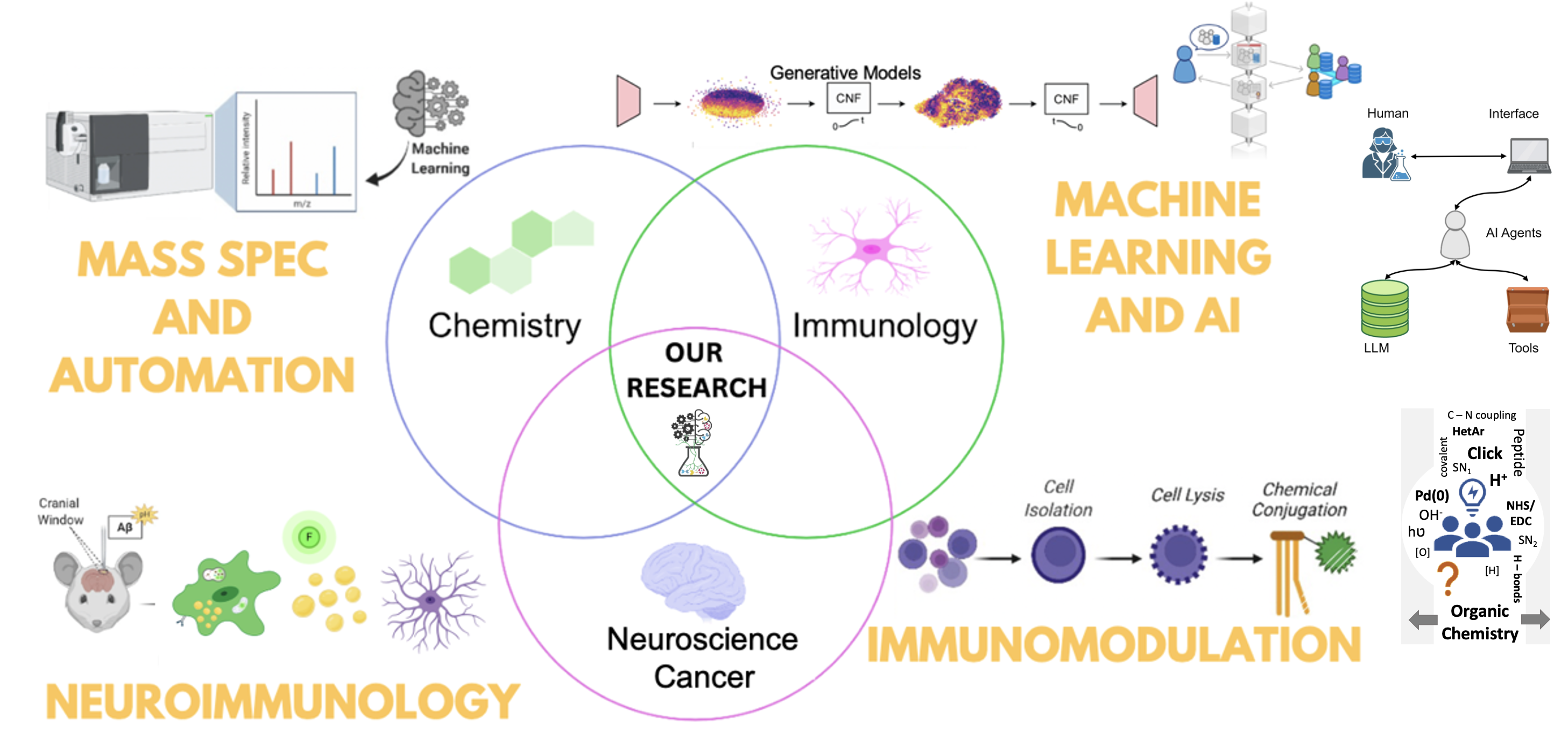Gaurav Chopra

- James Tarpo Jr. and Margaret Tarpo Professor of Chemistry, Director of Merck-Purdue Center | Analytical Chemistry, Physical Chemistry
- Email: gchopra@purdue.edu
- Phone: 66108
- Office: 261 DRUG/ 5171D BRWN
- Professor Gaurav Chopra's individual homepage
Research Summary
Chopra laboratory is a leading center for Chemical and Molecular Artificial Intelligence and Immunology that combines experimental chemistry and immunology with artificial intelligence (AI) towards a basic science guided translationally focused research program to improve human health in cancer and neurodegeneration. Our research program is focused on identifying and then targeting “brakes” of the immune system for cancer- and neuro- immunology. The initial focus is to translate novel immunological therapies for cancer and neurodegeneration by developing (i) bioanalytical methods (eg. single-cell lipidomics, multiplex assays, instrument modifications), (ii) chemical tools (eg. targeted fluorescent dyes, multicomponent reactions), (iii) targeted drugs (eg. immune and metabolic checkpoint inhibitors and degraders), (iv) AI methods and molecular modeling infrastructure to predict, validate and accelerate in vitro and in vivo experiments to develop immunomodulators, and (v) developing AI-guided infrastructure for digital health (e.g. digital biomarkers, therapeutics, interventions). Our lab has developed “AI co-pilot” infrastructure integrated with large language models for automating laboratory experiments to accelerate drug discovery and digital health. Our long-term goal is to harness the immune system for therapy for neurological diseases (Alzheimer’s disease) and solid tumors by targeting the functional lipid landscape and lipid accumulation of immune and glial cells. Harnessing the immune response for therapy has already demonstrated to provide durable long-term therapeutic responses with impact on disease progression and enhancing quality of life.
Our laboratory fosters a diverse and inclusive environment for all our members irrespective of their race, color, age, religion, sexual orientation, gender, disability, or national origin. We celebrate and use our differences to better our science. Our goal is to provide our members a safe space to thrive and pursue their scientific curiosities to their fullest potential. Our lab culture encourages creativity and persistence to solve problems. Students in our lab will have the opportunity to identify problems they are most interested in solving. Our goal is to train students into well-rounded scientists. In summary, we are looking for smart, talented and passionate individuals so that we can learn from them as much as they learn from us.
To increase diversity and openness in science for all ages, our group has developed a virtual reality-based AI drug discovery game called MINT and have conducted several outreach events for K-12 and university students to enhance their love for science. All software from the Chopra group is publicly available on GitHub .
Areas of Research:
Artificial Intelligence and Automation for Accelerating Drug Discovery, Development, Digital Health
[Automated Measurements, Characterizations, (Lipid)Omics Profiling, Mass Spectrometry, AI copilots]
Biophysical Modeling and Machine Learning for Drug Design and Synthesis
[Modeling, Synthesis, Drugs, Validation]
Immunology: Cancer- and Neuro- Immunology
[Target Discovery, Drugs, in vivo validation, Targeted dyes, animal models]

Education
-
2013-2016 JDRF Fellow,
University of California - San Francisco, School of Medicine
, San Francisco, CA.
Mentor: Professor Jeffrey A. Bluestone - 2010-2012 Postdoctoral Scholar, Stanford University School of Medicine , Structural Biology, Stanford, CA
-
2003-2010
Stanford University School of Engineering,
Stanford, CA.
M.S. in Scientific Computing/Computational Mathematics, May 2005 ; Ph.D. in Computational Mathematics, Jan 2010.
Mentor: Professor Michael Levitt ( 2013 Nobel Laureate in Chemistry ) -
2002-2003
University of California at Irvine, Henry Samueli School of Engineering,
Irvine, CA
.
M.S. in Mechanical and Aerospace Engineering, May 2003. -
1998-2002
Indian Institute of Technology – Delhi
, New Delhi, India.
B. Tech. in Mechanical Engineering, May 2002
Selected Awards
-
2024 Scialog Fellow for Automating Chemical Laboratories, Selected from nominees in US and Canada. Fellowship to develop advances in automated instrumentation and artificial intelligence (AI) for accelerating drug discovery.
-
2024 College of Science Leadership Award , Purdue University, Award for leading the Merck-Purdue Center and Chemical Intelligence Area
-
2023 AnalytiXIN (Analytics Indiana) Fellow in Life Sciences and Manufacturing, Award to combine AI to accelerate experiments in life sciences by developing experimental and modeling datasets in collaboration with Indiana companies.
-
2022 Grand Prize Winner NIH NCATS ASPIRE Reduction-to-Practice Challenge, Led the team in a competition that received #1 rank and prize to develop AI based drug discovery platform.
-
2022 NIH NCATS ASPIRE Reduction to Practice Award (Stage 2 Milestone 2)
-
2021 Two NIH NCATS ASPIRE Reduction to Practice Awards (Stage 1, Stage 2 Milestone 1)
-
2021 Acorns Seed for Success Award
-
2020 Undergraduate Advising Award, Purdue College of Science, Purdue University
-
2019 NIH NCATS ASPIRE Challenge #1 Award (NIH HEAL Initiative)
-
2019 NIH NCATS ASPIRE Challenge #3 Award (NIH HEAL Initiative)
-
2018 Teaching for Tomorrow Fellowship Award
-
2017 Ralph W. and Grace M. Showalter Research Trust Award
-
2017 Jim and Diann Robbers Research Award for New Investigators
-
2016 Instructional Innovation Award, Purdue University